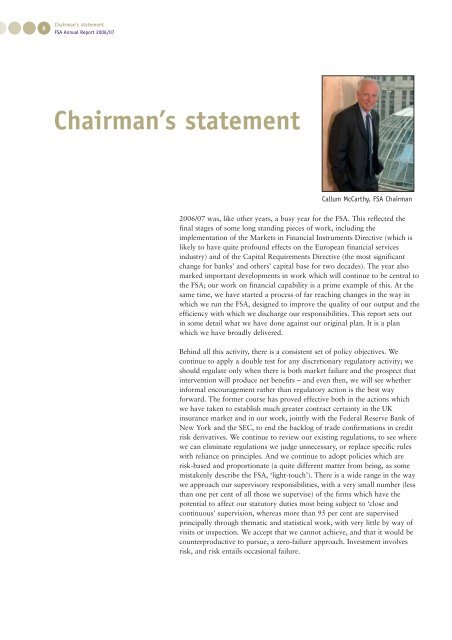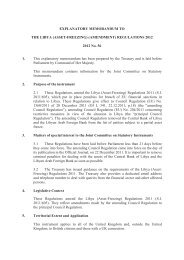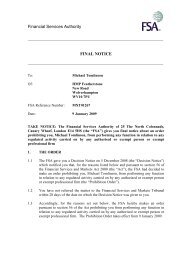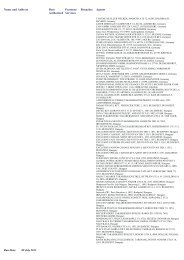FSA Annual Report 2006/07 - Better Regulation Ltd
FSA Annual Report 2006/07 - Better Regulation Ltd
FSA Annual Report 2006/07 - Better Regulation Ltd
You also want an ePaper? Increase the reach of your titles
YUMPU automatically turns print PDFs into web optimized ePapers that Google loves.
6<br />
Chairman’s statement<br />
<strong>FSA</strong> <strong>Annual</strong> <strong>Report</strong> <strong>2006</strong>/<strong>07</strong><br />
Chairman’s statement<br />
Callum McCarthy, <strong>FSA</strong> Chairman<br />
<strong>2006</strong>/<strong>07</strong> was, like other years, a busy year for the <strong>FSA</strong>. This reflected the<br />
final stages of some long standing pieces of work, including the<br />
implementation of the Markets in Financial Instruments Directive (which is<br />
likely to have quite profound effects on the European financial services<br />
industry) and of the Capital Requirements Directive (the most significant<br />
change for banks’ and others’ capital base for two decades). The year also<br />
marked important developments in work which will continue to be central to<br />
the <strong>FSA</strong>; our work on financial capability is a prime example of this. At the<br />
same time, we have started a process of far reaching changes in the way in<br />
which we run the <strong>FSA</strong>, designed to improve the quality of our output and the<br />
efficiency with which we discharge our responsibilities. This report sets out<br />
in some detail what we have done against our original plan. It is a plan<br />
which we have broadly delivered.<br />
Behind all this activity, there is a consistent set of policy objectives. We<br />
continue to apply a double test for any discretionary regulatory activity; we<br />
should regulate only when there is both market failure and the prospect that<br />
intervention will produce net benefits – and even then, we will see whether<br />
informal encouragement rather than regulatory action is the best way<br />
forward. The former course has proved effective both in the actions which<br />
we have taken to establish much greater contract certainty in the UK<br />
insurance market and in our work, jointly with the Federal Reserve Bank of<br />
New York and the SEC, to end the backlog of trade confirmations in credit<br />
risk derivatives. We continue to review our existing regulations, to see where<br />
we can eliminate regulations we judge unnecessary, or replace specific rules<br />
with reliance on principles. And we continue to adopt policies which are<br />
risk-based and proportionate (a quite different matter from being, as some<br />
mistakenly describe the <strong>FSA</strong>, ‘light-touch’). There is a wide range in the way<br />
we approach our supervisory responsibilities, with a very small number (less<br />
than one per cent of all those we supervise) of the firms which have the<br />
potential to affect our statutory duties most being subject to ‘close and<br />
continuous’ supervision, whereas more than 95 per cent are supervised<br />
principally through thematic and statistical work, with very little by way of<br />
visits or inspection. We accept that we cannot achieve, and that it would be<br />
counterproductive to pursue, a zero-failure approach. Investment involves<br />
risk, and risk entails occasional failure.









